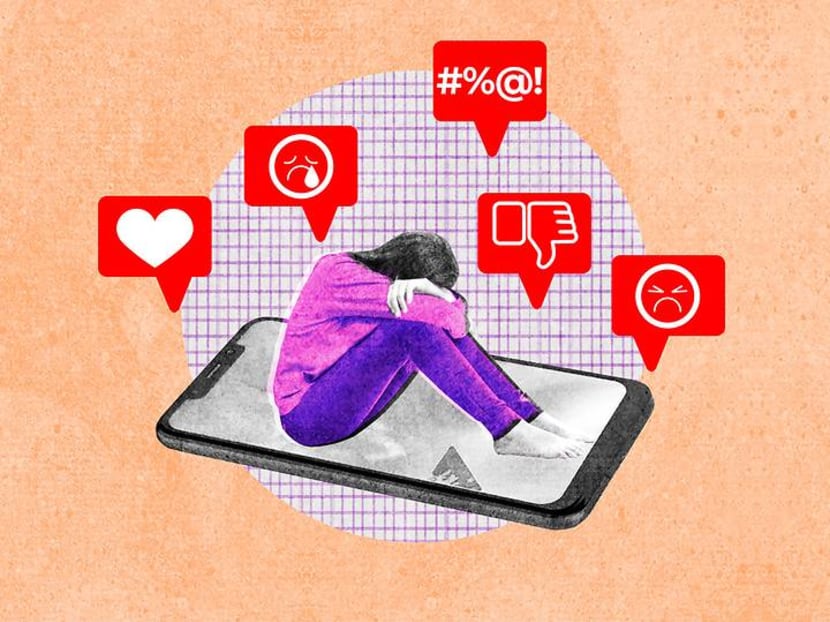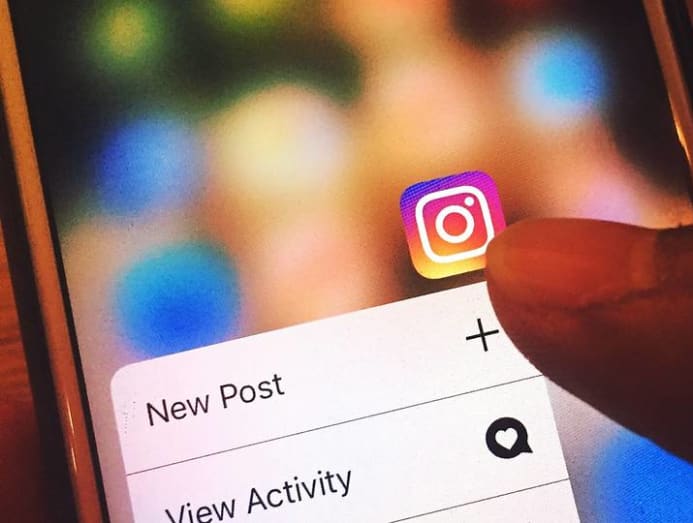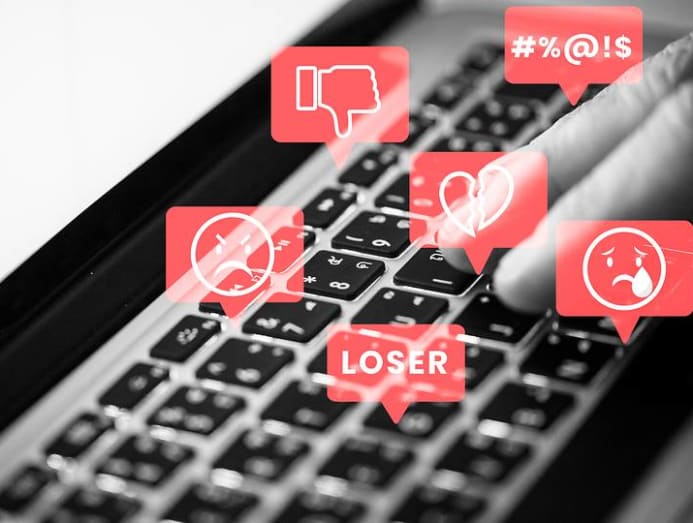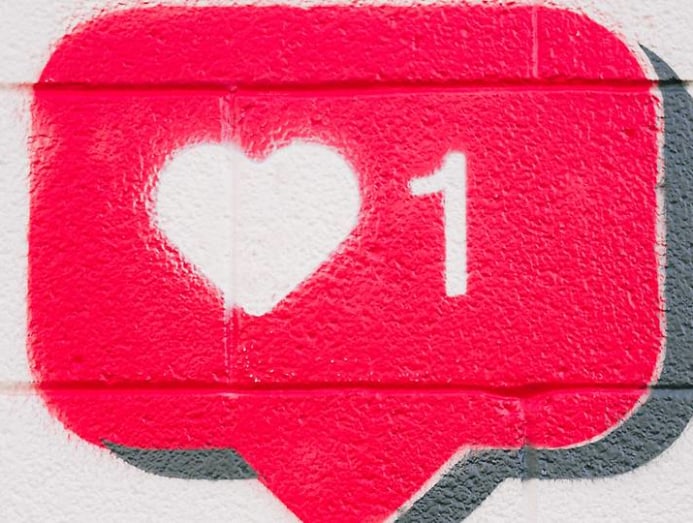Standing up to trolls and cyberbullying: How to deal with online harassment
Doxxing, flaming, revenge porn and other forms of online abuse are on the rise. But you don’t have to fall victim to these. Here’s how to reclaim your power.

(Art: Chern Ling)
Four months ago, I experienced the worst trolling in the history of my online existence.
That morning, I woke up to a barrage of essay-length comments from an anonymous account to an Instagram post of mine that began under the guise of “advice” and quickly spiralled into deeply personal – and irrational – attacks clearly designed to hurt and publicly humiliate me.
I’ll admit that I was initially rattled when I first read the vicious vitriol before I decided to steel myself and go on the offensive.
After much analysis, I arrived at the conclusion that the attempted character assassination was motivated by someone obviously salty about my life and lifestyle, evidenced by the multiple references they made to my online content comprised of mostly “cars, good food and travel” – and their feeble attempt to link it to my personal values in a disparaging way.
Now that is actually my work Instagram account and such content is simply par for the course in my job as a luxury lifestyle journalist.
For most of my career, I have underplayed this aspect of my life to even my closest friends precisely because I did not want to court green-eyed monsters.
This was until a few short years ago when I realised that not doing so is almost career suicide for a freelancer.
In arriving at the decision to reinvent myself as a hybrid journalist/digital creator, I asked myself why I should hide the flashy aspects of my job to the detriment of my career, which I’ve worked tirelessly to build – just to avoid inducing envy and hate in others.
That said, I’m not naive; I also understood that choosing to play the social media game would come with its fair share of risks – online abuse being one of them.
DON’T FEED THE TROLLS

In strategising my response to my first online troll, I consulted close cousin and popular content creator Aarika Lee, who has been far more successful and active longer in the online space, on how to deal with something like this.
Should I even dignify the comments with a response? Or would it be wiser to just ignore and delete them before more of my audience see it and risk negatively influencing their perception of me and damaging my reputation?
READ: These are the signs of workplace harassment in the age of remote work
I made the decision to address it head on because I refuse to be bullied into silence.
For anyone dealing with a similar situation, I would advise you to first seek to establish the intent of the abuser and understand that what they are ultimately trying to do is lob shame bombs your way. But you can choose to bat each one away and not let it stick to you.
Recognise it for what it is: A pathetic attempt by a coward to project their own unhappiness onto you. And it says much more about the individual and their character (or lack thereof) than you. “Bullying in general often stems from a place of hurt or insecurity,” Lee observed.
In crafting my response, I deployed a bit of investigative journalism. Could this be an ex with an axe to grind, perhaps? And could there be any legitimacy to the claims, I asked myself.

My take-down was epic.
Using a generous helping of wit and proper reason, I responded with a line-by-line rebuttal of every baseless statement, leaving no room for counter-arguments.
I also made a conscious choice not to delete the comments from my feed. Because if I did so, the ugly troll wins. So there they remain, as a victory flag symbolising the futility of such bullying tactics and as a reminder of triumph over evil should such ugliness surface once more.
I have not heard from that defeated troll since.
READ: Actress Keira Knightley opens up about the issue of sexual harassment
A GROWING SOCIAL MALAISE

Sadly, my encounter was not an isolated one nor was it unique.
According to a 2021 report by US-based Pew Research Centre, 41 per cent of Americans have personally experienced some form of online harassment in at least one of the six key ways that were measured: Offensive name-calling, purposeful embarassment, sustained harassment, sexual harassment, stalking and physical threats.
“Harassment is when one party intentionally demonstrates behaviour that causes or is likely to cause harassment, alarm or distress to another party,” explained Michael Chua, a therapist at Safe Space, a Singapore-based mental health ecosystem that matches those seeking counselling with qualified therapists, online and offline.
“Online harassment takes many forms such as trolling, doxxing, flaming, revenge porn, harassment and cyber stalking.”
SOMETHING SMELLS PHISHY
Now what if being assertive and standing up for yourself is not enough and the harassment persists or is of a different nature with more grievous repercussions, causing you mental or emotional stress?
For digital creators like Gursheel Dhillon, the most common form of online harassment they encounter is having their DMs flooded with unsolicited messages that are malicious and even obscene in nature.
Opening up their lives to the world on public platforms such as Instagram, she says, makes them more susceptible to being trolled.
“On most days, you get genuine people that are grateful for your advice and tips but there are days you get unsolicited messages that really make you cringe. It can be as inappropriate as sending you obscene pictures and videos, or numerous messages asking for your mobile number or to meet up for ‘coffee’,” she shared.
Dhillon was also recently the victim of catfishing, where her Instagram account was practically cloned using her own photos and videos the imposter had lifted from her real account. The fake account posed as @gursheeldhilon, differing from her real name by the use of one “l” instead of two.
“I was catfished four times in a span of one week, and in 30 minutes, almost 400 of my followers had accepted a follow request from the fake account,” she said.
The impersonator then DM-ed all her friends and asked for their credit card details. One even fell for it.
“I felt terribly awful when she messaged me telling me she had given her details away and the first thing I told her was to cancel her credit card. I could not sleep that night and I kept reporting the issue to Instagram and the account was only removed a few days later,” she recalled.
WHY ARE SOME PEOPLE SO MEAN?

For mental health therapist-turned-activist Aarti Olivia Dubey aka @curvesbecomeher, digital detoxes are necessary when fat-shaming trolls take too much of a toll.
“As a plus-sized person, I experience online harassment on a regular basis – largely from people hiding behind anonymous accounts and some of it specifically coordinated by groups,” she revealed.
According to Dubey, there are many fat-hate groups out there that launch coordinated attacks on a rotating target each day.
“They have created fake Tinder profiles using images from my blog. One person even took all of my images from a swimsuit post and used them to make fat people memes and express his blatant disgust for my body for a post on his own blog,” she disclosed.
READ: Reading bad news endlessly? You’re doomscrolling again – here’s how to stop
WHAT THE EXPERTS SAY
As Lee observed earlier, cyberbullying does indeed have more to do with the bullies’ own insecurities.
“Often, these bullies are people who have been abused or are suffering abuse themselves. Feeling helpless, they project their inner misery onto others in the form of written abuse,” said Dr Jasmine Yeo, Safe Space’s clinical supervisor. “They may suffer from an identity issue; an insecurity about their own identity or have poor self-image.”
“It’s a way of coping and signals a lack of self-esteem,” added her colleague Chua. “In order to mask how they actually feel about themselves, they focus attention on someone else to escape their own problems, to feel and get a sense of power and control over a situation or person.”
STOP, BLOCK, CONFIDE, RECORD AND REPORT
When asked for advice to help others deal with online harassment, all the personalities and professionals interviewed for this story prescribed a similar formula: Stop, Block, Confide, Record and Report – depending on the nature and severity of the harassment.
“Stop engaging as most perpetrators are seeking a reaction to see evidence they are causing harm. Do not respond to them and there is a chance the perpetrator will move on to another target,” said Chua.

Dhillon recommends blocking the pesky accounts: “One less follower, one less view will not make or break your success. Your mental peace and sanity are way more important.”
You can also use the “report” function on social media platforms like Instagram to report a troublemaking account.
“It is so important to safeguard your emotional and mental health so pick your battles. If it impacts you to the point of anxiety or depression, please speak with a therapist if you lack social support. I reach out to a loved one who has the capacity to hear me vent,” shared Dubey.
Blocking, however, can sometimes escalate abuse, particularly if the perpetrator is an ex-husband with a history of violence, for instance, and your physical safety is under threat.
In such cases, you may consider the option of making a police report.
“Should you need to take police action or make a report to the social media site, it would be helpful to keep a record of the harassment by taking screenshots,” Dubey noted.
So document the abuse before reporting it in the event that you succeed in your request for it to get taken down and you lose precious evidence.
Besides taking screen grabs, save any emails, voicemails and texts so if the need arises, you have the necessary evidence to make a stronger case against the perpetrator.
READ: How Singapore healthcare experts are using TikTok to reach out to more patients
SEEK PROTECTION
From a legal standpoint, you can also seek protection under the Protection from Harassment Act (POHA) in Singapore, which was enacted in 2014.
“People who are facing online harassment can consider seeking out a protection or false statement order, particularly on an expedited basis, if they think that the harassment or its effects are likely to continue (not a one-off incident). It may be possible to get an order on an expedited basis on the same or next day,” advised lawyer Carol Yuen, an associate with Peter Low & Choo LLC.

A protection order prohibits the perpetrator from communicating with the victim and the perpetrator may also be ordered to stop publishing any threatening, abusive or insulting communication or identity information of the target person.
This extends to the issue of doxxing, which refers to the act of publicly revealing and publishing private information about an individual with the intent to cause harm.
As part of POHA, the perpetrator can also be made to go for counselling.
The second order is a false statement order in which the court issues a stop publication or correction order.
“To protect themselves from future harassment, they should ensure the order prohibits the specific action that was the harassment; that the perpetrator cannot send messages to them or publish their name online, for example,” Yuen added.
RECLAIM YOUR POWER
As our experts have illustrated, abuse is, ultimately, about power and control.
So refuse to allow anyone steal your power. Remember, you do not exist to be anyone’s punching bag. You don’t have to just take it and suffer in silence. But be smart and strategic in how you choose to fight back and know that there are multiple avenues for recourse. Do bolster your cybersecurity, too.
What I find especially useful is picturing the bully for what he or she is: A cowardly insecure miserable person with low self-esteem who can only feel good about themselves by putting others down – online and otherwise. And I immediately feel better about myself.





